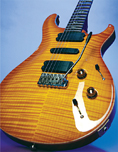Paul Reed Smith 513 Rosewood review
Tonal versatility in a glorious, but expensive, classically designed guitar

PAUL REED SMITH seems to have a keen awareness of what's missing in the guitar industry. For instance, in the early Eighties, he recognized that there were basically two kinds of players: those that played Gibsons and those that played Fenders. What was missing was a high-end guitar that offered something to both camps. Smith's original Custom model guitar filled that niche neatly as a classic hybrid of the Fender Stratocaster and Gibson Les Paul.
His latest epiphany is about tonal versatility. Smith observed that, while many engineers are using digital technology and complex processors to create new sounds for the electric guitar, few manufacturers are concentrating on getting more sounds out of the guitar itself.
Enter the new PRS 513 Rosewood electric guitar with five single-coil pickups that, together, offer 13 switchable configurations (hence the 513 model designation). But PRS didn't just drop this new pickup system into an existing guitar design; the 513 also features a brand-new neck shape, incomparable materials and several aesthetic innovations.
FEATURES
THE 513 ROSEWOOD is built around one of the most spectacular necks in the business. It's cut from rare Brazilian rosewood and only sealed with a light coat of linseed oil. For those unfamiliar with this wood, a fine piece of hand-selected Brazilian rosewood is more than just an outstanding looking slab of timber: it resonates with unparalleled warmth and clarity, smells fantastic and feels like the well-worn stock of a generations-old English shotgun.
The 513's neck shape is actually a brand-new profile for PRS and every bit as exciting as the pickups. It's fat and round, but not wide. If you are familiar with PRS's neck carves, this shape is somewhere between that of a PRS Standard and a Santana. Playability is exceptional, and notes are easy to access. Plus, with the palm of your hand always full of rosewood, fatigue is nonexistent even over the long term.
The 513's neck joint is one unique aspect of its design. Because the pickups require especially deep cavities, PRS was unable to extend the neck under the pickups, as on its other set-neck guitars. On the 513 Rosewood, the mahogany body actually extends under the neck's heel to provide the necessary support.
Get The Pick Newsletter
All the latest guitar news, interviews, lessons, reviews, deals and more, direct to your inbox!
Flawless fretwork added to the 513's playability, and the quarter-sawn Brazilian rosewood fretboard displayed attractive organic swirls of chocolate-brown grain. While I prefer the original PRS bird inlays, the 513's almost impressionistic mother-of-pearl birds are distinctive and beautifully rendered. Other artistic touches include an abalone-inlaid signature on the headstock, a truss rod cover inlaid with the 513 logo, scalloped amber/black bonnet knobs and a scalloped nut. A flamed maple "10 Top" cap is standard on the 513 Rosewood, as is the select mahogany body.
PICKUP SYSTEM
THE 513'S INGENIOUS passive pickup system consists of five proprietary single-coil pickups, a five-way pickup switch, a three-way mode blade switch and a very complex internal circuit board. Choosing from among the 13 pickup possibilities is rather intuitive. Using the five-way switch, located below the volume and tone knobs, you select pickup positions just as you would on most other guitars: the first notch activates the bridge-position pickup, the second selects the bridge and middle positions together, the third chooses the middle position alone, and so forth.
The blade switch, meanwhile, lets you choose from three pickup modes: Heavy Humbucking, Clear Humbucking and Single Coil. In Heavy Humbucking mode, side-by-side single coils are fused to create a hot humbucking tone. Clear Humbucking mode reduces the humbucker's output to simulate a tapped humbucking tone, while in Single Coil mode, only one side-by-side coil is active.
PERFORMANCE
BEFORE YOU QUESTION the price of a 513 Rosewood, you need to hear its acoustic tone. I don't know whether it's the craftsmanship or the synergy of the wood and metal components, but this guitar rang like a church bell and sang with the deep warmth of a cello. Overtones of one note continued to emanate from the guitar even after another note was struck, particularly in the upper registers. This wasn't a sibilant phenomenon; it was more like the airy resonance of a pipe organ sustained in a cathedral's dome.
The pickups' medium output and neutral voice allowed the 513's beautiful natural tone to translate extremely well through my Victoria and Mesa amplifiers. The tones were bold, warm and full bodied, with a firm foundation of ever-present midrange. Especially worthy of praise were the Clear Humbucker tones. Using either one humbucker or a combination of a humbucker and the middle single-coil yielded a hollow woody tone that can only be created by a stringed instrument of superior quality. The pickups were extremely quiet and controllable through high-gain channels as well, but I felt that the guitar's dynamic and smooth character lent it more to classic rock, jazz, country or blues applications.
THE BOTTOM LINE
VERY FEW PLAYERS can afford an instrument like the 513 Rosewood, but if you're one of the lucky few that can pony up the bucks, the PRS 513's fresh Brazilian rosewood neck shape and custom pickup system will reward you with a lifetime of glorious tone, unmatched versatility and pride of ownership.
“It combines unique aesthetics with modern playability and impressive tone, creating a Firebird unlike any I’ve had the pleasure of playing before”: Gibson Firebird Platypus review
“This would make for the perfect first guitar for any style of player whether they’re trying to imitate John Mayer or John Petrucci”: Mooer MSC10 Pro review










